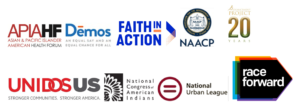We are heartened by the ruling from Judge Burroughs of the U.S. District Court of Massachusetts in Students for Fair Admission v. Harvard that affirms the “compelling interest in diversity and all the benefits that flow from a diverse college population” and upholds the use of race-conscious college admissions practices, asserting that they “have an important place in society and help ensure that colleges…can offer a diverse atmosphere that fosters learning, improves scholarship, and encourages mutual respect and understanding.” Yet, it is crucial to see this effort for what it was: a cynical ploy by conservative activist Edward Blum to destroy a critical pathway to opportunity for Black and Brown students.
Affirmative action programs in higher education have been reaffirmed repeatedly by the U.S. Supreme Court, as recently as 2016. The understanding is that diversity is a compelling interest in higher education, and programs that ensure a diverse student body are important because it allows for cross-racial understanding, erases stereotypes and prepares students for an increasingly diverse workforce and society. Race-conscious admissions are a way to safeguard against discrimination and race-conscious admissions benefit all students, including Asian Americans the majority of whom support race-conscious admissions.
In light of this ruling, we must continue the hard work of dismantling policies and practices in our education system, our economy, and elsewhere, that deny students of color the same opportunities as their white and wealthy peers. Today, after a concerted effort to limit or destroy affirmative action, Black and Latino/Latinx students are more underrepresented at selective colleges than they were nearly four decades ago, and those that do make it onto campus are saddled with higher costs and greater – often unpayable – debt than their white peers. The public and private institutions serving high numbers of students of color, including community colleges, Historically Black Colleges and Universities, Hispanic Serving Institutions, and Asian American and Native American Pacific Islander Serving Institutions, and Alaska Native and American Indian Tribal Colleges and Universities, are consistently underfunded by states and/or the federal government, resulting in an unequal education for the most diverse generation of students in American history. It is for these reasons that affirmative action is necessary to repair historic and current injustices and eliminate real biases and structural barriers in our higher education system.
To this day, many colleges still troublingly rely on tactics that persistently advantage whiteness. From the use of legacy admissions, the strategic use of merit aid, and admissions preferences for children of wealthy donors, too many institutions are engaging in practices that simply replicate white privilege and entrench inequality in our education system and our economy.
We are also extremely disappointed in the tactics of Mr. Blum and others to exploit the aspirations of Asian American students as part of a broader effort to end affirmative action. Rather than seek ways to dismantle diversity on campus, we need to improve the diversity of Asian American representation to include underrepresented ethnic groups of Southeast Asians, Native Hawaiians and Pacific Islanders. Wedging one racial group against another is a dangerous, if all-too-common, tactic that only serves to undermine support for a reparative, race-forward agenda.
Advancement Project National Office, Asian & Pacific Islander American Health Forum, Demos, Faith In Action, National Association for the Advancement of Colored People, National Congress of American Indians, National Urban League, Race Forward and UnidosUS are a collaborative of nine leading national racial equity anchor organizations supported by the W.K. Kellogg Foundation. Together we work to promote racial equity, advance racial healing, and ensure that all children, families and communities have genuine opportunities to reach their full potential.

